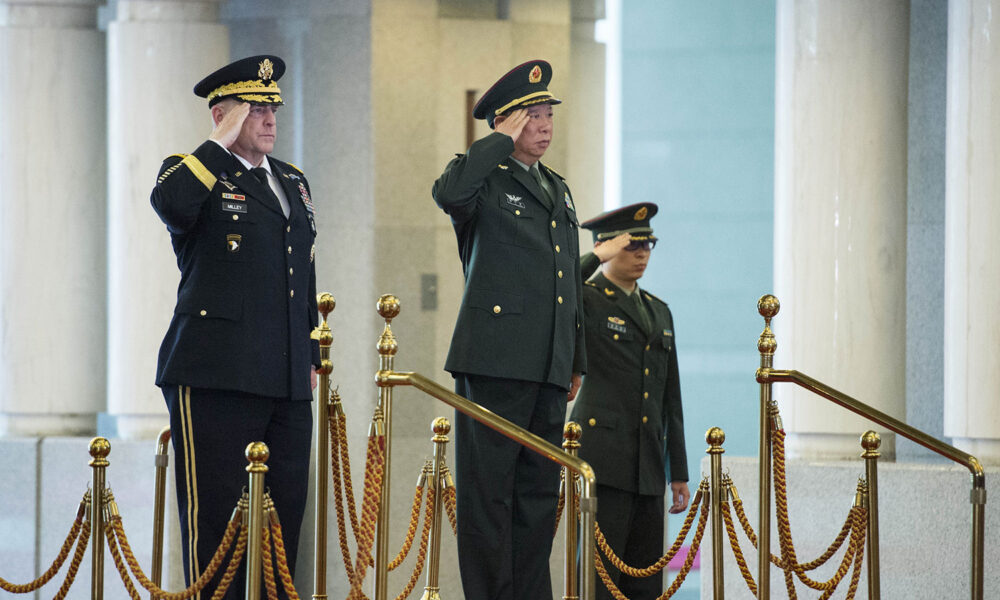Chinese leaders watch US politics and are afraid of what they see. If this fear played a role in their decision to build 200-300 new nuclear missile silos, it will also affect their approach to future nuclear arms control negotiations.
We now know that in October of 2020, and again January of 2021, Chinese leaders were so afraid they put their military forces on “high alert.” They thought the United States and China were on the brink of war. General Mark Milley, the US chairman of the Joint Chiefs of Staff, took extraordinary steps to assure Chinese leaders that was not true.
Congresswoman Nancy Pelosi was just as worried as the Chinese. Regarding the former President, she told Milley, “He’s crazy. You know he’s crazy. He’s been crazy for a long time.” The chairman agreed. Pelosi wanted the general’s assurance there were procedures in place to stop the president from using nuclear weapons. Milley’s response was not convincing.
If the highest-ranking officer in the US military could not completely reassure the Speaker of the House, who is third in the order of presidential succession and receives detailed briefings on the command and control of US nuclear weapons, it is highly unlikely Milley was able to reassure the Chinese, no matter what his counterpart, General Li Zuocheng, told him on the phone.
President Biden should immediately adopt a new procedure for launching U.S. nuclear weapons, one that requires the consent and confirmation of two other officials before any presidential nuclear launch order can be carried out. In addition, the US Congress should pass legislation that ensures no single US individual, including the US president, has the authority or the ability to start a nuclear war.
Political leaders in the United States and the rest of the world knew Donald Trump was unfit for the office, especially for his role as commander-in-chief of the US nuclear arsenal. But China’s communist leaders are worried about more than one person. The Iraq War, the 2008 financial crash and Trump’s election in 2016 all gave rise to international concerns about US competence and stability.
Not long after the chaotic transition of power that frightened Chinese leaders and Speaker Pelosi, President Biden tried to reassure an audience of global security elites that “America is Back.” But most Republican office holders, along with over 74 million US voters, supported Trump. A swing of 40,000 votes in a few key states, out of over 155 million cast, would have left Trump in control of the US nuclear arsenal. The ex-president is a leading candidate for the Republican presidential nomination in 2024, and he has inspired imitators ready to follow in his footsteps if he is unwilling or unable to run again. Chinese leaders are aware of these US domestic political realities.
Moreover, Biden and the Democrats embraced a confrontational approach to China. The language they use is slightly different. The former administration’s “great power competition” was changed to “strategic competition.” Biden also expressed an interest in setting up “guardrails” to prevent competition from leading to military conflict. But while his rhetoric is less abrasive, Biden preserved a lot of the new military spending proposed by his predecessor, including funds for the development of a controversial new nuclear-capable submarine launched cruise missile intended for use everywhere but “particularly in Asia.”
Chinese leaders have yet to acknowledge they are constructing hundreds of new missile silos, which may be an indication of how difficult it will be to begin substantive discussions about nuclear weapons policy with the United States. The US decision to withdraw from the INF Treaty, along with its earlier decision to withdraw from the ABM Treaty, diminish the value of bilateral or multilateral negotiations, since Chinese leaders could not depend on the United States honoring any bilateral agreement they might reach.
China prefers international arms control negotiations conducted under the auspices of the United Nations at Conference on Disarmament (CD) in Geneva. The United Nations gives more states a seat at the negotiating table and produces more stable agreements, like the Treaty on the Nonproliferation of Nuclear Weapons (NPT), the Chemical Weapons Convention (CWC) and Biological Weapons Convention (BWC). These international treaties are more likely to endure, and provide and more reliable long-term guides for Chinese military planning and procurement.
The Comprehensive Nuclear Test Ban Treaty (CTBT) was the first international nuclear arms control agreement China had a hand in drafting. The US Senate’s failure to ratify the treaty in 1999, and its refusal to reconsider ratification for more than twenty years, undermined China’s willingness, and its ability, to negotiate future agreements. Most of the core group of nuclear arms control experts China put together to negotiate the CTBT have retired. US disinterest in negotiating a Fissile Material Cut-off Treaty (FMCT), and its opposition to discussing an international agreement on the weaponization of outer space, which could place limits on missile defenses, left Chinese leaders with little incentive to prepare successors.
Before China’s leaders decide to begin filling their new silos with new nuclear-armed missiles, President Biden should try to get them to the negotiating table. His best chance is in Geneva at the CD. But no matter how earnest Biden’s outreach may be, China’s leaders will be looking to the next presidential election. It will most likely take sustained interest in negotiations by a succession of US presidents, from both parties, to convince Chinese leaders the United States is genuinely interested in nuclear arms control and disarmament.

